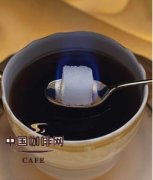Should the caffeine in coffee be made public?

In August 2008, Starbucks in the United States was accused of having too much caffeine in its coffee. Hong Kong Ming Pao sampled coffee from five coffee chains on the market, and the results showed that a cup of ordinary medium cup instant coffee on the market already contained 150 to 200 milligrams of caffeine, with Starbucks having the highest caffeine concentration. Office workers are refreshed in the morning, afternoon and evening, which has exceeded twice the recommended maximum intake of 300 mg for adults. Most of these coffees are freshly ground and strong, so do these freshly ground coffees really have higher caffeine or do more harm to people? Zou Lei, vice chairman of the Beijing Coffee and Coffee Beverage Professional Committee, first denied that fresh ground coffee is high in caffeine, telling reporters that the taste of coffee has nothing to do with how much caffeine it contains. Caffeine content first depends on the type of coffee. The better coffee is Arabica Coffee, which itself contains less caffeine, while coffee such as Robasda is inherently high in caffeine, which is 3 to 5 times higher than Arabica coffee. In addition, the amount of caffeine also depends on the concentration of coffee, while the roasting process does not change caffeine very much.
The reporter interviewed several coffee chain companies in Beijing over the past few days and found that none of the company's cafes can clearly identify the exact caffeine content. However, it is not new for Starbucks to be found to contain high caffeine. As early as April 2004, the Wall Street Journal hired an experimental facility to test the caffeine content in coffee. Starbucks, a coffee chain, had particularly high caffeine levels, which led the agency to suspect Starbucks of being addictive with high caffeine levels. Often questioned by the media, Starbucks Coffee Co., Ltd. now usually responds to interviews about caffeine content with a statement. Starbucks' average drip coffee contains about 200 milligrams of caffeine for every 8 ounces of coffee liquid, the statement said. Low-caine filtered coffee contains about 4.8 milligrams and 11.2 milligrams per 8 ounces of coffee liquid. The statement said Starbucks coffee is absolutely guaranteed. It has been revealed that Taiwan launched the "traffic light" of instant coffee in August this year, indicating that coffee shops should indicate the caffeine content of each type of coffee on the menu, with a green light of less than 100 mg, a yellow light of 100 to 200 mg, and a red light of more than 200 mg. It's best to have no more than one cup a day.
In fact, the effect of caffeine on the human body varies from person to person. Liu Dongli, director of the Nutrition Department of the Air Force General Hospital, said that adults can absorb 300 milligrams of caffeine (about three cups of brewed coffee) a day. Within this range, it will not affect human health. On the contrary, it is a very good drink, which can both refresh and have no negative effect. However, she also pointed out that long-term excessive intake of caffeine can also make the central nervous system overly alert to the effects of caffeine and cause nervousness. According to the EU Scientific Committee on Food, caffeine affects the central nervous system, kidneys and cardiopulmonary circulation. Therefore, it is not suitable for certain people to drink coffee. For example, for people with anxiety disorders, caffeine can worsen symptoms such as sweaty palms, palpitations and tinnitus, while for people at risk of high blood pressure, the use of large amounts of caffeine will only make the condition worse.
Important Notice :
前街咖啡 FrontStreet Coffee has moved to new addredd:
FrontStreet Coffee Address: 315,Donghua East Road,GuangZhou
Tel:020 38364473
- Prev

What if excessive consumption of coffee for a long time will have adverse consequences?
In the case of long-term coffee intake, large doses of caffeine is a drug that can lead to caffeine poisoning. Symptoms of caffeine poisoning include addiction and a range of physical and psychological reactions, such as nervousness, irritability, anxiety, tremors, muscle convulsions (hyperreflexia), insomnia and palpitations. Most people take caffeine because of its stimulating effect, and many students are responding.
- Next

Coffee with high calories is iced coffee, but iced coffee is the most likely to get fat.
Iced coffee, which is popular in summer, is actually high in calories, with some iced coffee as high as 561 calories, equivalent to a dinner, according to a new study by the World Cancer Research Fund (WCRF). Most iced coffee has more than 200 calories, some more than 450 calories, the BBC reported, citing WCRF data. The foundation points out that sugar and full-fat cattle
Related
- Beginners will see the "Coffee pull flower" guide!
- What is the difference between ice blog purified milk and ordinary milk coffee?
- Why is the Philippines the largest producer of crops in Liberia?
- For coffee extraction, should the fine powder be retained?
- How does extracted espresso fill pressed powder? How much strength does it take to press the powder?
- How to make jasmine cold extract coffee? Is the jasmine + latte good?
- Will this little toy really make the coffee taste better? How does Lily Drip affect coffee extraction?
- Will the action of slapping the filter cup also affect coffee extraction?
- What's the difference between powder-to-water ratio and powder-to-liquid ratio?
- What is the Ethiopian local species? What does it have to do with Heirloom native species?

